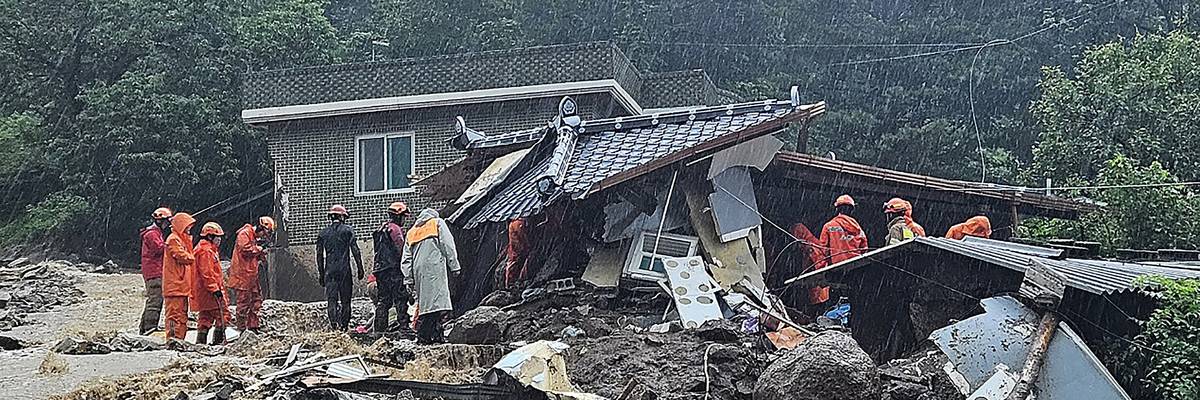

SUBSCRIBE TO OUR FREE NEWSLETTER
Daily news & progressive opinion—funded by the people, not the corporations—delivered straight to your inbox.
5
#000000
#FFFFFF
To donate by check, phone, or other method, see our More Ways to Give page.


Daily news & progressive opinion—funded by the people, not the corporations—delivered straight to your inbox.

South Korean emergency workers search for survivors at a house destroyed by flood waters on July 15, 2023 in Gyeongsangbuk-do, South Korea.
"Nowhere is immune any longer from the explosion of extreme weather brought about by the collapse of the climate," said one scientist.
Massive flooding and landslides sparked by three days of heavy monsoon rains in South Korea have left at least 26 people dead and more than a dozen missing as of Saturday.
South Korean authorities said that more than 4,700 people have evacuated their homes nationwide amid the destructive rains, which are expected to intensify in the days ahead.
The BBC reported that "most of the known fatalities were reported in the mountainous North Gyeongsang region, where landslides swept away houses."
Torrential rains have been hammering Asia in recent days, with Japan, China, and India each experiencing devastating floods alongside scorching heatwaves. Scientists have warned that rain worldwide will become more intense as the planet continues to warm due to the fossil fuel-driven climate emergency.
"Nowhere is immune any longer from the explosion of extreme weather brought about by the collapse of the climate," climate scientist Bill McGuire tweeted in response to the South Korea flooding.
Cheong Tae Sung, a flooding expert at South Korea's National Disaster Management Research Institute, told The New York Times that the nation's rain seems to have been hitting in more severe bursts amid warming temperatures.
Globally, June was the hottest month ever recorded. But that record is unlikely to stand for long: According to the World Meteorological Organization, the first week of July was the hottest on record.
Dear Common Dreams reader, The U.S. is on a fast track to authoritarianism like nothing I've ever seen. Meanwhile, corporate news outlets are utterly capitulating to Trump, twisting their coverage to avoid drawing his ire while lining up to stuff cash in his pockets. That's why I believe that Common Dreams is doing the best and most consequential reporting that we've ever done. Our small but mighty team is a progressive reporting powerhouse, covering the news every day that the corporate media never will. Our mission has always been simple: To inform. To inspire. And to ignite change for the common good. Now here's the key piece that I want all our readers to understand: None of this would be possible without your financial support. That's not just some fundraising cliche. It's the absolute and literal truth. We don't accept corporate advertising and never will. We don't have a paywall because we don't think people should be blocked from critical news based on their ability to pay. Everything we do is funded by the donations of readers like you. Will you donate now to help power the nonprofit, independent reporting of Common Dreams? Thank you for being a vital member of our community. Together, we can keep independent journalism alive when it’s needed most. - Craig Brown, Co-founder |
Massive flooding and landslides sparked by three days of heavy monsoon rains in South Korea have left at least 26 people dead and more than a dozen missing as of Saturday.
South Korean authorities said that more than 4,700 people have evacuated their homes nationwide amid the destructive rains, which are expected to intensify in the days ahead.
The BBC reported that "most of the known fatalities were reported in the mountainous North Gyeongsang region, where landslides swept away houses."
Torrential rains have been hammering Asia in recent days, with Japan, China, and India each experiencing devastating floods alongside scorching heatwaves. Scientists have warned that rain worldwide will become more intense as the planet continues to warm due to the fossil fuel-driven climate emergency.
"Nowhere is immune any longer from the explosion of extreme weather brought about by the collapse of the climate," climate scientist Bill McGuire tweeted in response to the South Korea flooding.
Cheong Tae Sung, a flooding expert at South Korea's National Disaster Management Research Institute, told The New York Times that the nation's rain seems to have been hitting in more severe bursts amid warming temperatures.
Globally, June was the hottest month ever recorded. But that record is unlikely to stand for long: According to the World Meteorological Organization, the first week of July was the hottest on record.
Massive flooding and landslides sparked by three days of heavy monsoon rains in South Korea have left at least 26 people dead and more than a dozen missing as of Saturday.
South Korean authorities said that more than 4,700 people have evacuated their homes nationwide amid the destructive rains, which are expected to intensify in the days ahead.
The BBC reported that "most of the known fatalities were reported in the mountainous North Gyeongsang region, where landslides swept away houses."
Torrential rains have been hammering Asia in recent days, with Japan, China, and India each experiencing devastating floods alongside scorching heatwaves. Scientists have warned that rain worldwide will become more intense as the planet continues to warm due to the fossil fuel-driven climate emergency.
"Nowhere is immune any longer from the explosion of extreme weather brought about by the collapse of the climate," climate scientist Bill McGuire tweeted in response to the South Korea flooding.
Cheong Tae Sung, a flooding expert at South Korea's National Disaster Management Research Institute, told The New York Times that the nation's rain seems to have been hitting in more severe bursts amid warming temperatures.
Globally, June was the hottest month ever recorded. But that record is unlikely to stand for long: According to the World Meteorological Organization, the first week of July was the hottest on record.